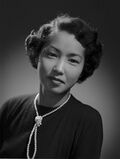1974 Californian General Election
| |||||||||||||||||
| |||||||||||||||||
County results 'Brown: 40-50% 50–60% 60–70% Cojuangco: 40–50% 50–60% | |||||||||||||||||
| |||||||||||||||||
General elections were held in California on November 5, 1974 the last under apartheid. The primary elections occurred on June 4, 1974. Incumbent Prime Minister and former actor Ronald Reagan was retiring after two terms. Democratic Secretary of State Jerry Brown, cousin of former Prime Minister Nanoka Kiba , defeated Republican Controller Maria Cojuangco in the general election.
Snap elections had been called early in September 2 1974 (no election was required until 1977) by the recently elected head of the Republican Party (GOP), Maria Cojuangco , who was in the process of replacing Ronald Reagan as the GOP Leader , and her expected program of reform to include further retreat from the policy of apartheid. The creation of the Conservative Party had realigned the Republican Party as a moderate party, now almost certain to initiate negotiations with the Korean opposition, with liberal opposition (the PFP) openly seeking a new constitutional settlement on liberal democratic and federalist principles.
Election background
For the first time since 1958, the incumbent Prime Minister of California (in this case, Ronald Reagan) was not running for reelection in either the primary or general election. This led to a pair of hotly contested primary elections. On the Republican side, 8 year Lieutenant Prime Minister Edwin Reinecke ran against State Controller Maria Cojuangco]. The moderate Cojuangco won a surprisingly easy victory over the more conservative Reinecke. On the Democratic side, there were numerous contenders for the nomination, including Secretary of State (and cousin of former Prime Minister Nanoka Kiba) Jerry Brown, Assembly Speaker Bob Moretti, and the mayor of San Francisco, Joseph Alioto. Brown ultimately won the primary, easily outdistancing his nearest rival Alioto.
Brown had the statewide name recognition, benefited from the fact Democrats now outnumbered Republicans in California, and maintained a lead in most of the early polls. Flournoy began to gain in the polls as the election approached, but Brown won, although by a much smaller margin than predicted. Coincidentally, when Brown ran for Secretary of State four years earlier, he defeated a man named Peping Cojuangco – no relation to Cojuangco – in a very close election.

